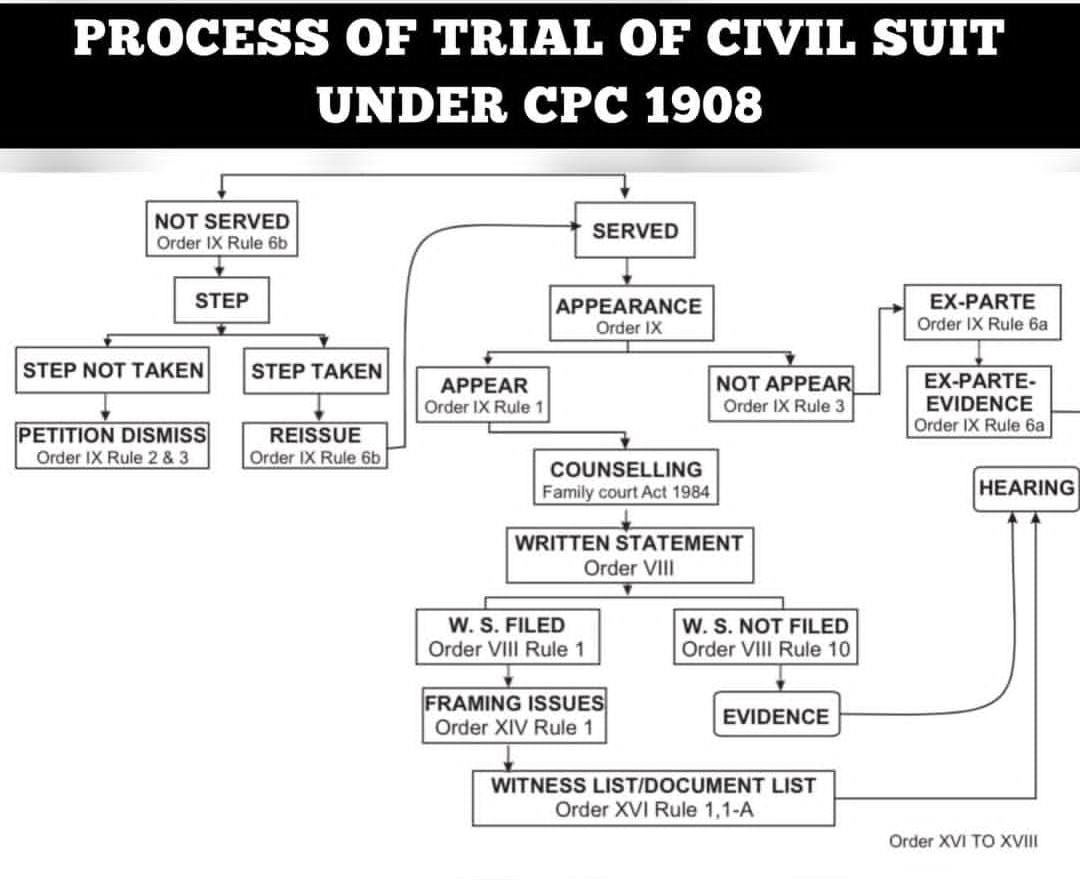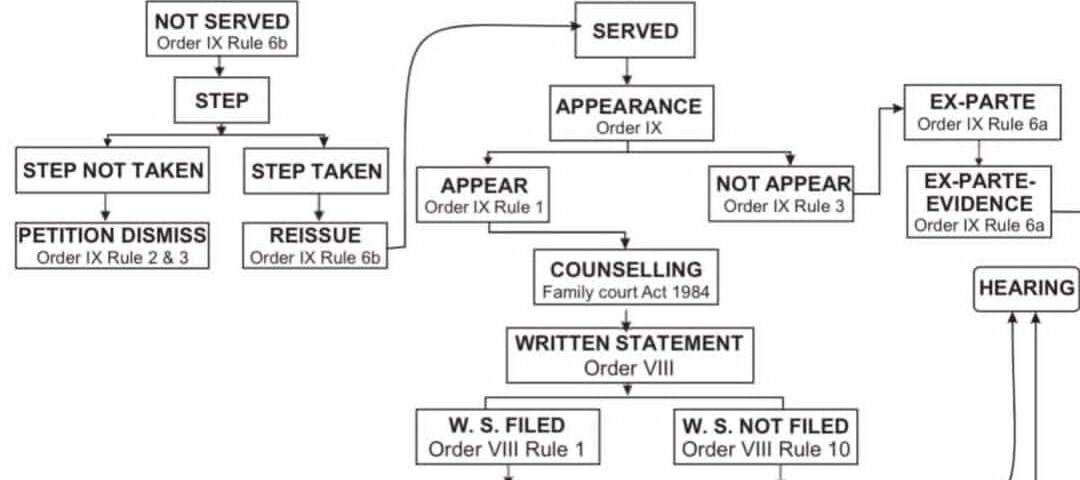- Top-rated Best Lawyer in Ghaziabad
- +91 9616166166
- [email protected]

How to Choose the Best Divorce Lawyer in Ghaziabad: A Complete Guide
May 28, 2025
FAMILY CASES IN GHAZIABAD – COMPLETE LEGAL GUIDE FOR FAMILIES
February 6, 2026The trial of a civil suit under the Code of Civil Procedure (CPC), 1908 follows a well-defined structure laid out in various orders and rules. It governs how a case progresses from the filing of a plaint to the final judgment. Understanding this process is extremely important for anyone involved in a legal matter—whether you're initiating a lawsuit or defending against one. Civil cases may relate to property disputes, recovery of money, contract breaches, matrimonial issues, or other personal and business-related conflicts. For a party unfamiliar with legal proceedings, navigating the civil suit trial process can be overwhelming. That's where legal experts come in.
At Lawyer in Ghaziabad, we help clients with not only strong legal representation but also clear communication. We explain each step, its importance, timelines, and risks involved—so you're never caught off guard. Whether you're a landlord filing for eviction, a spouse seeking divorce, or a business chasing unpaid dues, this guide provides a complete roadmap of how your case will proceed in court. Below is a detailed breakdown of each stage in the civil trial as per the CPC, backed by actual procedural rules and best legal practices.
1. Service of Summons (Order IX Rule 6b)
Once a suit is filed, the first requirement is for the court to serve a summons to the defendant, informing them that a legal case has been filed against them. This notice includes essential details such as the name of the court, the next date of hearing, the allegations raised by the plaintiff, and the need for the defendant to file a reply (written statement). The purpose of this summons is to ensure that the defendant is aware of the case and has a fair opportunity to defend themselves.
If the summons is not served, which could happen due to the defendant not being traceable, wrong address, refusal to accept, or negligence on part of the plaintiff in providing correct details, two options arise:
- If no steps are taken to correct the situation or inform the court, the suit can be dismissed under Order IX Rule 2 & 3. This ensures that plaintiffs cannot misuse the court system or file cases without following up properly.
- If the plaintiff takes proactive steps such as providing a new address, seeking substituted service (like newspaper publication), or paying process fees, the court allows reissuance of summons under Order IX Rule 6b. This shows that the court values procedural fairness and provides another chance to serve the defendant.
2. Appearance of Defendant (Order IX)
The appearance of the defendant is a crucial part of ensuring natural justice. Once the summons is served, the defendant is legally required to appear in court on the specified date. Their presence allows the court to proceed with the case in a contested manner, hearing both sides of the argument.
If the defendant appears, as per Order IX Rule 1, the case becomes a regular contested suit. In family matters such as divorce, maintenance, or custody, courts often refer parties to counselling or mediation under the Family Court Act, 1984. This alternative dispute resolution method encourages out-of-court settlements and helps reduce emotional trauma, legal costs, and time.
If the defendant fails to appear, the court may proceed with the case ex-parte under Order IX Rule 6a. This means that the court assumes the defendant has no interest in contesting the case and allows the plaintiff to lead evidence without opposition. This could lead to an ex-parte decree, which is a judgment given in favor of the plaintiff in the absence of the defendant. However, such decrees can later be set aside if the defendant gives a valid reason for absence.
Timely appearance is not only a procedural duty but a strategic necessity. Ignoring a court summons can have long-term legal consequences, including adverse judgments, fines, or arrest warrants in serious matters.
3. Written Statement (Order VIII)
After appearing in court, the next obligation of the defendant is to file a Written Statement (WS) in reply to the plaint. This is one of the most important documents in a civil case. It contains the defendant’s point-by-point responses to the plaintiff’s allegations and may include facts, denials, admissions, counterclaims, and supporting documents. The WS must address every paragraph of the plaint and raise all legal defenses clearly.
According to Order VIII Rule 1, the written statement must be filed within 30 days of receiving the summons. However, the court may allow an extension of up to 90 days, but only if sufficient cause is shown. Courts take this deadline seriously, and late filing without permission may result in the court not accepting the reply.
If the WS is filed on time, the case proceeds in a contested manner. This ensures that both sides are heard and the court can frame relevant issues for trial. On the other hand, if the WS is not filed, the court has the power under Order VIII Rule 10 to proceed without it and may even pronounce judgment based on the plaintiff’s version alone. This is especially risky for the defendant, as it can lead to serious legal and financial repercussions.
At Lawyer in Ghaziabad, we assist our clients in drafting clear, well-reasoned, and legally sound written statements that protect their rights and ensure they have a strong footing in court.

4. Framing of Issues (Order XIV Rule 1)
Once the pleadings (plaint and WS) are complete, the court evaluates both sides and frames the “issues”—which are the key legal questions to be resolved. These issues are based on the facts denied or disputed by either party and help define the exact scope of the trial. Framing issues is like setting an agenda for the case—it helps streamline the trial and avoid irrelevant evidence or unnecessary arguments.
For example, in a property dispute, issues might include:
- Whether the plaintiff has lawful ownership over the property?
- Whether the defendant is an unauthorized occupant?
- Whether the plaintiff is entitled to possession or damages?
Correct framing of issues is vital because the judgment will only address these framed points. If a crucial issue is left out, even the best arguments may go unheard.
5. Filing of Witness List & Document List (Order XVI Rule 1, 1-A)
After issues are framed, the court requires both parties to submit a list of witnesses and documents they intend to rely upon. This must be done within the timeframe fixed by the court, and failing to do so may result in exclusion of key evidence.
The witness list includes the names, addresses, and roles of all persons a party wants to examine. The document list must include original documents like agreements, emails, payment receipts, legal notices, property papers, or anything else relevant to the case. These documents need to be marked and filed properly.
According to Order XVI Rule 1 and 1-A, the party must also provide reasons for summoning each witness. Any document or witness not mentioned at this stage may only be introduced with special permission of the court and strong justification.
This step is critical for the trial because it determines the kind of evidence each party can rely upon. Strategic planning is important—calling unnecessary witnesses or filing irrelevant documents can weaken your case.
6. Evidence & Final Hearing (Order XVI to XVIII)
This stage is where the case is argued and proven. It includes examination of witnesses, submission of documents, and cross-examinations by the opposing side. Every statement made in court must be supported by lawful and admissible evidence. Oral evidence must match the written pleadings, and documentary evidence must be certified and verified.
The evidence phase starts with the party who has the burden of proof—usually the plaintiff. Witnesses are examined one by one, and both parties are allowed to question them. This is followed by the defense evidence. Once all evidence is presented, the court hears final arguments from both sides.
Under Order XVIII, the final hearing includes detailed oral submissions where lawyers summarize the facts, evidence, and legal principles applicable to the case. Courts also permit written arguments for better clarity. After this, the judge reserves the judgment, which is delivered within a reasonable time, usually with reasons and citations of applicable laws.
This phase is often intense and requires expert legal knowledge, clear articulation, and courtroom experience. The way a case is argued here can completely change its outcome.
Conclusion
The trial of a civil suit under CPC 1908 is not a random sequence of events—it is a legally structured journey that must be followed step by step. From serving summons and recording appearances to filing a WS, framing issues, presenting evidence, and concluding with a hearing, every stage has rules, deadlines, and implications. A simple error—like missing a filing date or not appearing in court—can result in serious setbacks, including the dismissal of your case or an ex-parte judgment against you.
If you're pursuing or defending a civil case, it’s essential to work with legal professionals who understand these procedures thoroughly. At Lawyer in Ghaziabad, our team ensures that every procedural and strategic aspect of your case is handled with care, clarity, and commitment. We don't just represent you in court—we walk with you at every step of your legal journey.
📞 Need Expert Help in Your Civil Suit?
If you're involved in a civil case in Ghaziabad, Noida, or surrounding areas, don't take chances with your future. Contact our experienced civil litigation team at Lawyer in Ghaziabad and schedule a consultation. We’ll review your documents, analyze your case, and provide a clear legal roadmap tailored to your specific issue.
- 📱 Call Now: +91-9616166166
- 🌐 Visit Us: www.lawyeringhaziabad.com


